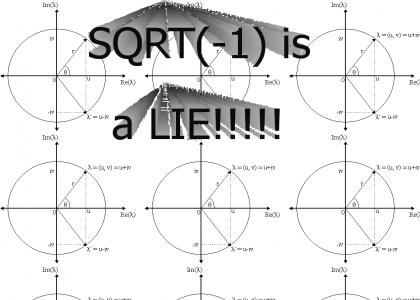Imaginary Numbers
Created on: April 15th, 2006

Euler's Formula's, biatches
Sponsorships:
| user | amount | user | amount |
|---|---|---|---|
| No one has sponsored this site ( ._.) | |||
| Sponsor this site! | Total: $0.00 | Active: $0.00 | |
Vote metrics:
| rating | total votes | favorites | comments |
|---|---|---|---|
| (3.5) | 6 | 0 | 6 |
View metrics:
| today | yesterday | this week | this month | all time |
|---|---|---|---|---|
| 1 | 0 | 0 | 0 | 2,013 |
Inbound links:
| views | url |
|---|---|
| 50 | https://www.bing.com |
| 9 | http://www.google.com.hk |
| 2 | http://ytmnsfw.com/assets/9095ec6aa0b0445fb1fb01fa473bc10c |
| 1 | https://www.google.com/ |
| 1 | http://imaginationclub.googlepages.com/ |
As an electrical engineer, I'm gonna have to disagree with you there, chief. (Although I felt exactly the same way back when I first learned about imaginary numbers.)
Complex numbers are needed to model certain physical systems in physics and engineering.
If you want another example of why they're important, the fundamental theorem of algebra (which deals with the number of roots a given polynomial equation has) can only be proven if one allows complex numbers as solutions.
Bold
Italic
Underline
Code
User Link
Site Link